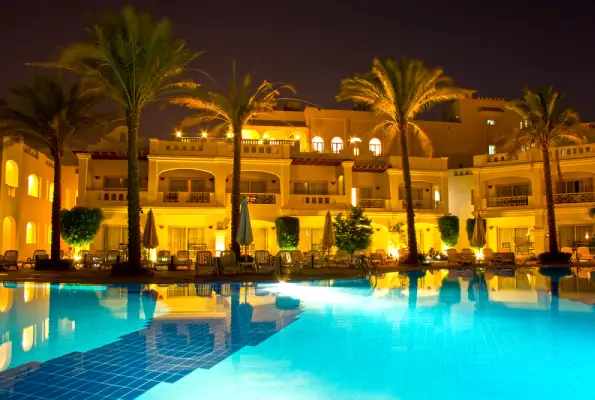The Abdel Fattah El-Sisi administration is selling assets, including some to a convicted murderer with Emirati cash, amid austerity and inflation.
As twilight descended over the lush Marriott Mena House hotel grounds, a pool reflecting the Great Pyramid of Giza darkened.
As guests gathered for dinner, a band played a smooth jazz rendition of the Eagles’ Hotel California on the grassy lawns, while the staff tried to act normally despite the hotel’s recent acquisition by an infamous Egyptian real estate tycoon, Hisham Talaat Moustafa, and two powerful Emirati conglomerates.
The Emirates financed the sale of Mena House and six other historic hotels, which Timothy E Kaldas, an analyst of Egypt’s struggling and opaque economy, called “an underwhelming fire sale” of state assets as the government seeks cash injections and deepens debt.
Egypt’s top real estate developer, Moustafa, has returned to business. Icon, his hospitality subsidiary, owns many premium hotels in Cairo and buildings in Egypt’s future capital, Sisi’s crown jewel.
His Talaat Moustafa Group (TMG) owns seven Egyptian heritage hotels, including Mena House. Other memorials to Egypt’s recent past are the Sofitel Winter Palace in Luxor, the Old Cataract in Aswan, and the Steigenberger Cecil on the Alexandria seashore. International hotel groups run the hotels, but Icon obtained a majority interest in the Egyptian government corporation that controlled them.
The USD 800 million in sales to Moustafa brought in foreign currency, according to Egyptian Prime Minister Mostafa Madbouly. He claimed that “a well-known international strategic investor” financed the sale.
After weeks, it was revealed that the mystery buyers were the Abu Dhabi Developmental Holding Company (ADQ), a sovereign wealth fund in the Emirati capital, and its subsidiary, Adnec Group, proprietors of London’s ExCel centre.
Recently, Emirati investors bought Egyptian buildings and firms, notably the USD 200 million sale of Cairo’s Tahrir government complex.
Bloomberg reported that an Emirati consortium is in talks to buy land on Egypt’s north shore for USD 22 billion, including TMG.
Cairo is selling large areas of land and historic hotels to reduce its debt. Moustafa and others close to Sisi have benefited economically as his population suffer from austerity and inflation. Egypt is the second-largest IMF debtor behind Argentina and is in talks to raise its loan package.
“This is clearly a country selling public assets under duress,” said Tahrir Institute for Middle East Policy expert Kaldas, while adding, “Egypt’s finances are unsustainable.”
Mena House, a royal hunting lodge turned hotel in 1887, has a cocktail bar and dining room with a view of the pyramids. The historic wing has luxurious suites, including Winston Churchill’s 1943 Cairo meeting room and a reproduction of Egyptian diva Uum Kalthoum’s bedroom.
In one of its dining rooms, Egyptian President Anwar Sadat and Israeli representatives held peace talks, demonstrating the past might of Egyptian diplomacy.
Luis Monreal, general manager of the Geneva-based Aga Khan Trust for Culture and a longstanding Mena House visitor, believed the new owners understood Egypt’s ancient hotels’ value beyond money.
“They’re part of Egypt’s history, tourism that helped integrate Egypt into the world,” he said.
Moustafa was convicted in 2009 of paying USD 2 million to a former policeman to cut Suzanne Tamim’s throat at her Dubai condominium.
After the murder occurred on their property, the Emirates were furious that Moustafa, a member of the Egyptian elite deemed above the law, was tried in Cairo. Egypt does not extradite its residents.
The murder plan inspired the film The Nile Hilton Incident, which was never shown in Egyptian cinemas due to government censorship. The trial horrified the Egyptian populace and brought down the super-rich. From jail, Moustafa sent a widely publicised letter denying the claims.
“These lies will not be able to move the great pyramids I have constructed in the Egyptian economy,” he added.
His words were mocked yet proved prophetic. After a retrial and a 15-year sentence, Moustafa spent half before Sisi pardoned him. His new employment as a broker for Emirati capital injections into the Egyptian economy seemed unaffected by his earlier conviction.
ADQ and Adnec did not comment on the deal or why Emirati wealth funds are choosing Moustafa.
The Sofitel and Steigenberger hotels also declined comment. Mena House’s Marriott hotel representative stressed that business was as usual. The deal does not affect daily business or our employees, they claimed.
Kaldas noted that selling hotels will ultimately hurt the state’s fundraising efforts because the badly needed foreign revenue will go elsewhere.
“The Egyptian state received USD 800 million, which is great, but it will always lose revenue from these assets. This is a plaster, he added, lighting money on fire for an unsustainable economic model plagued by an insatiable patronage network at the expense of the public interest.
“This will not stabilise the economy, it just kicks the can down the road – Egypt owes USD 30 billion next year,” he warned.



